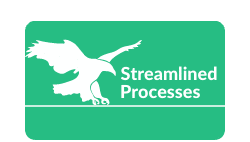For Enterprise Marketing Automation, see our main page here.
Understanding the Value of Enterprise Marketing Automation
Enterprise Marketing Automation is the engine behind scalable, efficient, and data-driven marketing strategies in today’s fast-paced business world. As companies grow, manual marketing methods quickly become unsustainable. Therefore, automation helps manage complexity while maintaining brand consistency.
Most importantly, it enables large organizations to personalize outreach, unify their customer data, and optimize every campaign touchpoint. From triggered email responses to predictive lead scoring, automation strengthens both customer retention and acquisition strategies.
This article was created with the assistance of AI tools and reviewed by our team at Streamlined Processes LLC to ensure accuracy and relevance.
Key Features Vital to Large-Scale Campaign Management
Enterprise Marketing Automation platforms offer deep integration, customization, and control features that go beyond standard software solutions. These platforms often include:
- Multichannel campaign orchestration
- Dynamic audience segmentation
- Asset and workflow management
- AI-driven content personalization
- Advanced analytics and BI integration
For example, a global e-commerce brand may run synchronized campaigns across email, SMS, and social platforms. Using a centralized dashboard, they monitor campaign performance in real-time, making rapid adjustments mid-flight. Consequently, they reduce waste and improve ROI.
Why Enterprise Marketing Automation Outperforms Traditional Methods
Manual marketing is time-consuming, inconsistent, and error-prone. As your audience grows, human oversight often leads to missed opportunities or branding missteps.
In contrast, Enterprise Marketing Automation ensures faster decision-making and better targeting. AI and machine learning tools help marketers identify patterns, forecast behavior, and automate responses. As a result, marketing teams can focus more on creative and strategic tasks.
Moreover, automation reduces the risk of missed follow-ups and ensures consistency across geographical regions, departments, and products—a task nearly impossible to manage manually at scale.
Enterprise Marketing Automation in Action: A Case Study
Consider a financial institution with diverse offerings across several countries. Before automation, their product teams worked in silos, sending disconnected campaigns. After implementing an Enterprise Marketing Automation solution, they created unified customer journeys tailored to each client segment.
The results were impressive: a 35% increase in email engagement, a 28% lower churn rate, and stronger internal alignment between departments.
Selecting the Right Platform for Your Business
Choosing an Enterprise Marketing Automation platform isn’t just about features—it’s about alignment with your objectives.
Before deciding, consider the following:
- Does it integrate with your CRM, website, and data platforms?
- Can it scale as your business grows globally?
- Does it support personalization at every stage of the customer lifecycle?
- Are the reporting tools robust enough to support executive decisions?
Some popular platforms include Adobe Experience Cloud, Salesforce Marketing Cloud, and Oracle Eloqua. Each has its strengths, and their effectiveness depends on your industry, team capability, and organizational maturity.
Trends Shaping the Future of Marketing Automation
As AI technologies mature, their role in Enterprise Marketing Automation will continue to expand. Predictive analytics will become more reliable, and generative AI will play a larger role in content creation.
Furthermore, privacy regulations like GDPR and CCPA have pushed automation providers to offer better consent management and data governance tools. In other words, marketing automation isn’t just about personalization—it’s about responsible personalization.
Additionally, marketers are beginning to integrate real-time customer feedback loops into their automated systems. For example, if users react negatively to a message, it can trigger content changes in future outputs instantly.
Challenges Enterprises Must Solve During Implementation
Despite its benefits, rolling out Enterprise Marketing Automation comes with challenges:
- Data silos can limit system performance
- Training teams on new platforms takes time
- Custom development can be cost-prohibitive
- Getting executive buy-in requires clear ROI projections
However, a phased rollout plan backed by internal champions tends to increase adoption. Therefore, it’s helpful to start with one campaign or region and then scale.
For example, a consumer electronics company piloted automation in its European division before launching globally. Lessons learned early helped them streamline their global deployment.
How Enterprise Automation Improves Coordination Across Teams
Automation platforms act as a single source of truth for marketing teams, sales departments, and customer service centers. Centralized assets, approval workflows, and scheduling tools ensure everyone is on the same page.
Consequently, fewer delays occur at launch, and campaigns perform better since every stakeholder has insights into customer behavior and progress tracking.
Metrics That Matter in Enterprise Marketing Automation
Tracking success goes beyond open and click-through rates. With Enterprise Marketing Automation, these are the metrics that deserve attention:
- Customer Lifetime Value (CLV)
- Marketing Attribution Accuracy
- Lead-to-Customer Conversion Rate
- Multichannel Engagement Score
- Cost per Acquisition (CPA)
To clarify, raw engagement is helpful, but connecting activity to revenue is what truly validates your automation investment.
Optimizing Your Automation Strategy for Long-Term Success
It’s not enough to implement automation—you need to optimize and evolve it continuously.
Firstly, conduct quarterly audits to ensure data accuracy and campaign alignment with business goals. Secondly, refresh customer segments as behaviors and market conditions shift. Likewise, test new AI features offered by your platform vendors.
Most importantly, involve cross-functional teams—from sales to IT—to keep your campaign execution well-rounded and up to date.
Frequently Asked Questions (FAQ)
- What types of businesses need Enterprise Marketing Automation?
Any organization managing complex campaigns across channels or regions can benefit. Industries like finance, healthcare, education, retail, and logistics use it most extensively. - Can small businesses use these platforms?
While technically possible, the investment typically outweighs the value for smaller teams. Mid-sized and enterprise organizations get more ROI from such solutions. - How long does implementation take?
It depends on integration scope and team readiness. For most enterprises, full deployment takes 3 to 6 months. - Do these tools replace marketers?
Not at all. They amplify a marketer’s capabilities by automating repetitive tasks. Strategy and creativity still require human touch. - Is AI necessary for automation?
AI enhances automation but isn’t mandatory. However, platforms with AI features offer better personalization and optimization potential.
Final Thoughts on Driving Growth with Marketing Automation
Enterprise Marketing Automation offers a systemized approach to building scalable, personalized, and insightful campaigns. Its tools empower marketers to engage smarter, not harder. When implemented effectively, it transforms not just individual campaigns, but company-wide performance.
Above all, automation is a long-term investment. The more you align it with your data, team, and strategy, the greater your marketing edge becomes.
Follow us on Facebook here.

